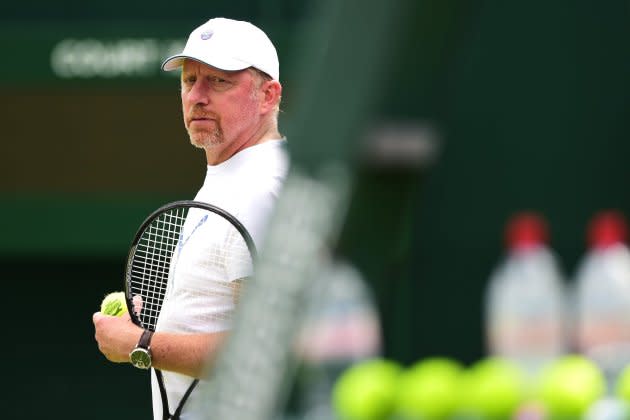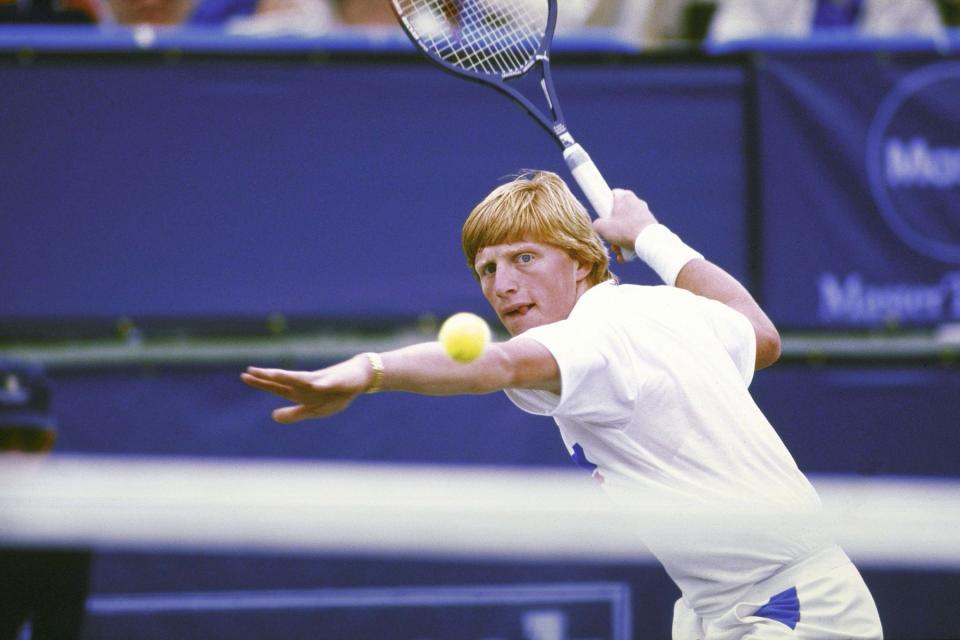Sex, Money, and Power: The Rise and Fall of Tennis Great Boris Becker
- Oops!Something went wrong.Please try again later.

An early scene in Boom Boom! The World vs. Boris Becker, a new two-part documentary about the German tennis great who famously won Wimbledon at the age of 17 before going down like the Hindenburg, encapsulates what’s made the athlete such a controversial figure. Ion Tiriac, a Romanian businessman who managed Becker at the height of his powers, from 1984 to 1993, compares the athlete to “a child” tempting fate by repeatedly sticking his finger into a flame.
“He just tries to see if he’s getting burned or not getting burned,” Tiriac says.
More from Rolling Stone
Directed by one of the world’s most prolific documentary filmmakers, Alex Gibney (Enron: The Smartest Guys in the Room, Going Clear: Scientology and the Prison of Belief), and premiering on Apple TV+ April 7, Boom Boom! features two long sit-down interviews with Becker, who is now 55 — in 2019, as Becker was facing a bankruptcy auction following a series of financial missteps, and in 2022, days before Becker faced jail time in London for failing to repay his debts and tax evasion, concealing some of his finances. (He was ultimately sentenced to 30 months in jail, and released on Dec. 15, 2022, after serving eight months behind bars.)
Gibney’s film also contains interviews with those in and around Becker’s orbit, including Tiriac; his ex-wife Barbara; Novak Djokovic, who was coached by Becker from 2014-2016; and contemporary rivals John McEnroe and Bjorn Borg, the latter of whom Becker idolized growing up.
It’s an extraordinary story: Becker was born in Leimen, a relatively small town in West Germany. He won his first tennis tournament at the age of 6, started competing professionally with men at 14, became a pro at 16, and won Wimbledon in 1985 at the age of 17, becoming the youngest Major champion ever. It’s fascinating to watch footage of a teenage Becker, looking every bit the German schoolboy with his parted red hair and flush-red cheeks, dispatching tennis greats en route to hoisting the greatest trophy in pro tennis. It’s no surprise that Becker soon became a teen idol, attracting a number of brand-sponsorship deals and raking in millions, guided all the while by Tiriac, a protective manager and shrewd marketing mind.
“I was like a little boy in a toy shop,” Becker says of his Wimbledon run.

In the late-‘80s, Becker became addicted to sleeping pills — even claiming he was drowsy from sleeping pills during the 1990 Wimbledon Final, which he lost to Stefan Edberg in five sets. Part of Becker’s mystique was his tendency to put himself in bad situations on the court, falling down a set or two, and then fighting back to win in dramatic fashion. He would go on to win six Grand Slam titles, including Wimbledon in 1985, 1986, and 1989.
He was also an iconoclast. One of the most fascinating portions of Boom Boom! concerns his relationship with his ex-wife Barbara Becker, who is Black. Becker met the designer and model in 1992, and the two married in 1993, when she was eight months pregnant with their child. They famously posed nude together on the cover of Germany’s Stern magazine in 1993, and their relationship became tabloid fodder, with the German media targeting the pair with racist attacks. One German paper even ran the headline, “Go Back to the Bush” about his wife, and the couple was dogged by death threats and forced to travel with security guards. Their ugly media treatment calls to mind the predicament of another celebrity ginger and his Black partner: Prince Harry and Meghan Markle.
“He had that glow — that atmospheric energy of changing the room and making it lighter and brighter,” says his wife Barbara in the film, adding, “For the hero, the blond, blue-eyed German, to pick a Black woman as his wife was a big deal.”
Things really began to go south for Becker in 1999. After losing in straight sets in the fourth round at Wimbledon to Aussie Patrick Rafter, Becker, who’d recently lost his father, acknowledged that it was his last Wimbledon tourney. That night, Becker told Barbara — who was pregnant with their second child — that he wanted one last night to party hard as a professional tennis player before he hung it up. So, he went to Nobu with some pals and ran into Angela Ermakova, a Russian woman he’d encountered at the same trendy London restaurant a couple of weeks prior.
“Lots of things happened,” Becker says in the doc of the Nobu encounter. “I can tell you we went to the back room — no, it wasn’t the cupboard, the cupboard is way too small… we got together, we had sex. I had no number from Angela, I had no contact, and that was that. Went back to my team, my boys, paid the bill, and I went home.” The encounter is said to have lasted all of five seconds.
Eight months later, Angela emerged, heavily pregnant, and told Becker he’s the father.
“I said, well, I believe you — we had sex — but you have the baby, and we go to the doctor, and we make the DNA test, and if it’s my baby, I’m responsible for it, I will look after it. Period,” Becker maintains in the documentary.
It’s here that Gibney, who narrates the film, informs the viewer that Becker’s recollection does not line up with reality (one of many instances of this). At the time, Becker did not take responsibility for the child; rather, he vehemently denied it in outrageous fashion. He crowed to the press that it was all a conspiracy — that Angela had only performed oral sex on him, stolen his sperm, and inseminated herself. He even hinted that the Russian mafia had a hand in it.
“I didn’t take him down. He took himself down,” Angela says in archival footage.
In January 2001, Barbara was granted a divorce from Becker, walking away with $14.4 million, their home in Florida, and full custody of their two children. One month later, Becker acknowledged that he was the father of Angela’s child. And then, in 2002, the German courts came after Becker for owing €1.6 million in back taxes, because he lived in Munich for a few years in the ‘90s while claiming residence in the tax haven of Monaco. Becker paid a hefty fine and avoided jail time.
Now facing financial troubles, Becker made a number of poor financial decisions — securing a €4.6 million loan from a British bank against his future earnings and taking out a €1.25 million bridge loan on his home in Mallorca, Spain, with 25 percent interest.
“A lot of athletes, we believe that the amount of money we earn during our careers will continue to come in after, so we don’t adapt our lifestyles quick enough,” Becker confesses in the film. “You keep on spending money that you don’t make anymore — you spend the money that you make before. So, yeah, I’m blaming me.”
A British bank ultimately forced him to liquidate his assets to pay his bills, including selling a number of his tennis trophies. In 2018, Becker made the publicity rounds saying that the Central African Republic had offered him a job as its attaché for Sports/Humanitarian/Cultural Affairs in the EU. The job apparently granted him diplomatic immunity status from his U.K. bankruptcy. Unfortunately, the man who arranged the deal, Stephan Welk, was a grifter who had granted Becker a fake diplomatic passport. Around this time, his second wife, Lilly, filed for divorce, citing Becker’s booze problem, and his ex-business partner, Hans-Dieter Cleven, emerged alleging that Becker owed him over €40 million in back pay. Throughout Boom Boom!, the impression you get of Becker is a deeply naïve man who gained early fame, was micromanaged for his early adult life, and who constantly found himself attracting leeches.
In an interview conducted two days before his 2022 sentencing, he begins to weep thinking about his predicament.
“It’s very hard. It’s hard. I think my… my bottom… I will know what to make of it. I face it, you know, I’m not going to hide or run away. [I will] accept whatever sentence I get,” he says. “There’s a reason for this. There’s a reason why this is happening. My life has always been a little different than most other lives.”
He pauses, adding, “That’s not the end yet. There’s going to be another chapter.”
Best of Rolling Stone

